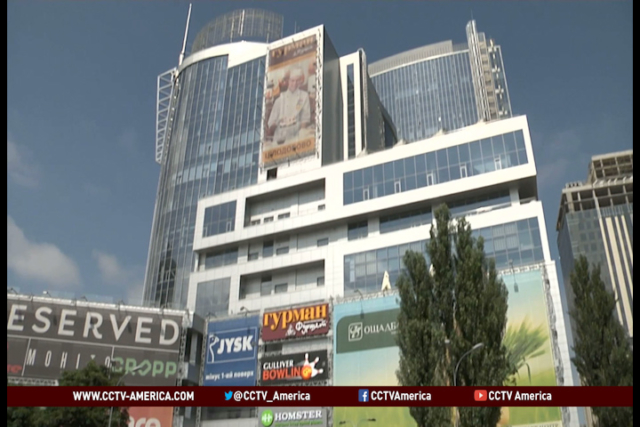Ukraine’s economy has taken a beating in recent months because of tensions with Russia. But there’s one industry that’s proving to be a bright spot. CCTV’s Roee Ruttenberg explains.
Follow Roee Ruttenberg on Twitter @RoeeRuttenberg

Starting Block: Start-ups in Ukraine
Ukraine's economy has taken a beating in recent months because of tensions with Russia. But there's one industry that's proving to be a bright spot. CCTV's Roee Ruttenberg explains.The software these Ukrainians are making may soon appear in your computer. Despite months of insecurity in the country, business for this IT startup is actually going very well.
Vlad Voskresensky, CEO of Invisible CRM, said: “These days, in any part of the world, when you say you’re Ukrainian, you have at least 20-30 minutes attention, because people are asking ‘what’s going on… what’s really going on there… how can we help you…’ etc etc.”
Vlad Voskrensensky says Ukraine’s crisis has actually made selling his product abroad easier.
He said: “If you’re a good sales guy, salesperson, and you know how to sell, you can use this just as a reason to talk to guys, to talk to people and then shift it closer to the business-related topic.”
The industry appears to be growing. A decade ago, Ukraine had five IT entrepreneurs like Vlad. Now it has nearly 5,000.
Denys Dovgopoliy has witnessed that expansion. He helps startups raise funds, both domestically and abroad.
Deny Dovgopoliy from BVU Group, said: “During the revolution, all deals were halted, until the situation stabilized. Now, after the election, the Russian deals have disappeared almost completely from the market. But the total amount of deals has actually RISEN because they have been replaced by funds from the US and Europe.”
Many IT workers actually earn in dollars. So the double-digit devaluation of Ukraine’s currency means they now earn even more. That’s driving some to leave their traditionally low-paying jobs, which effectively now pay even less, and try their hand in IT.
They’re being encouraged by signs from abroad. In March, the Polish president announced his country would invest $100 million in Ukrainian’s IT sector–a decision welcomed by the country’s aspiring entrepreneurs.
Vlad Voskrensensky said: “They actually were an absolutely brilliant neighbor for us, they were helping Ukrainians on all of the fronts, from medical help to people who got injured in the square, up until that 100 million fund allocated to invest in Ukraine. As a sign, as a step, it’s absolutely brilliant.”
He’s helping other countries soon follow suit.
While Eastern Europe is one of several regions becoming a prime destination for software outsourcing, Pakistan is another. CCTV’s Rachelle Akuffo reports.
Follow Rachelle Akuffo on Twitter @RachelleAkuffo

Starting Block: Start-ups in Pakistan
While Eastern Europe is one of several regions becoming a prime destination for software outsourcing, Pakistan is another. CCTV's Rachelle Akuffo reports.Too often, stories about Pakistan conjure up images of religious conflict, violent attacks and a country striving to achieve economic reforms.
Through the hardship, bright, colorful signs of hope appear from a new wave of video gamer developers. The popular game ‘Fruit Ninja’ was one of a growing number coded in Lahore, Pakistan from a three-year-old startup.
Saad Zaeem from Caramel Tech Studios, said: “Fruit Ninja was downloaded almost 500 million times till today, and Jetpack Joyride had won many awards including Apple Design Award, Pocket Gamer Award. So we worked very closely with them on these two products, and we got them to multiple stores, multiple different devices, and it was one of the biggest things on our portfolio.”
Pakistan’s small, but growing I-T industry is worth an estimated two-point-eight billion dollars. The open floor plans, mixed gender teams and uplifting atmosphere have led some to call it a ‘slice of Silicon Valley’.
But it’s still a relatively new sector, employing close to 25-thousand people. At “We-R-Play” studios in Islamabad, developers draw inspiration for their smartphone game, “Dream Chaser”, from their surroundings.
Waqar Azim from We R Play studios said: “Basically his world is crumbling and he has to collect these dreams to, you know, well, fix his world.”
Startups have the odds stacked against them — three out of four will fail. In Pakistan there are added risks of constant power outages and security. But there are also benefits.
Waqar Azim said: “The costs associated with developing a game are definitely very low compared to the West. So, that’s an advantage.”
It’s also a key factor in Pakistan becoming a more attractive destination for software outsourcing. The blossoming gaming industry is putting entertainment and economic gains in the hands of Pakistani startups.
For an in-depth look at the issues facing startups in conflict regions, CCTV’s Rachelle Akuffo is joined by Zubair Iqbal, Adjunct Scholar at the Middle East Institute and the former IMF Deputy Director of Central Asia and the Middle East, to discuss more.
Follow Rachelle Akuffo on Twitter @RachelleAkuffo

Starting Block: Zubair Iqbal on start-ups in conflict zones
For an in-depth look at the issues facing start-ups in conflict regions, CCTV's Rachelle Akuffo is joined by Zubair Iqbal, Adjunct Scholar at the Middle East Institute and the former IMF Deputy Director of Central Asia and the Middle East, to discuss more.
 CGTN America
CGTN America
